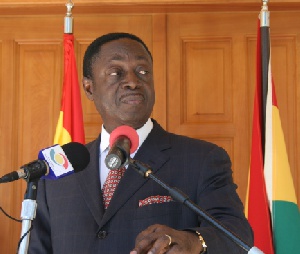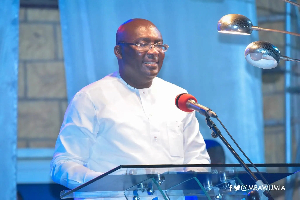A former governor of the central bank, Alex Ashiagbor, has urged government to consider cutting its rising expenditure as part of measures to curb recurrent budget deficits.
Mr. Ashiagbor, speaking at the outdooring of the Institute for Fiscal Studies (IFS) in Accra yesterday, blamed governments for failing to control unbridled spending without boosting revenue sources -- describing this as a major source of worry.
“If your revenues are not forthcoming and you don’t have money, yet you keep on expanding your expenditure commitments, where do you get money to make for instance statutory payments? We should address the problem of persistent and consistent budget deficits over the years. If in a year or two you have difficulties, that’s understandable,” he said.
Government’s guidelines on the preparation of the 2015-17 budget prepared for MMDAs forecasts an expenditure of GH¢43.5bn, which is about 19.8% higher than 2014's revised projection of GH¢36,358.3million.
Ghana’s persistent deficit slippage underlines the fiscal stress from wages, interest payments and weak tax revenues. In 2012, government’s budget deficit soared to 12 percent of GDP -- raising serious concerns about its fiscal discipline.
According to the revised 2014 budget statement, government is targetting 8.8 percent deficit of GDP -- a figure ratings agency Fitch has forecast will overshoot to more than 10 percent.
The former Bank of Ghana governor opined that the current deficit levels are not sustainable. “Our lifestyle as a country, which is represented by the budget deficit, is clearly unsustainable. I don’t believe in the much-touted homegrown economic policies. The only policy is to live within your means. If you can’t discipline yourself then it will be imposed on you from outside: that’s what will send us to the IMF,” he said.
Without fiscal discipline, he said, the country will not be in a position to wean itself from Bretton-Woods institutions like the International Monetary Fund (IMF).
Ghana is currently in advanced negotiations with the IMF on a possible funding programme. Government officials have consistently stated that the decision to engage the IMF was made to seek support for the country’s much-touted homegrown economic policies.
In addition to that, the leader of government’s team in the negotiations, Dr. Kwesi Botchwey, has maintained government will be hoping to seal a full Fund programme that includes technical and financial assistance.
“If you cannot discipline yourself, it will be imposed on you from external organisations like the IMF. These normally come with conditions that we very much complain about.”
The birth of Institute for Fiscal Studies
According to Dr. Kwabena Duffuor, founder and President of the Institute, IFS was established to contribute to Ghana’s fiscal management and macroeconomic transformation.
“The mission rests on two basic premises: first that growth and development occur where there’s sustained sound management of the economy.
“Second, such management is more likely to conduct relevant policy research into relevant policy issues, analyse public practical recommendations that put government finances on sustainable path and share the information freely with policymakers, parliamentarians etc,” he added.
IFS was established last March as a politically independent non-profit think-tank devoted to the provision of economic policy advice, advocacy and world-class training.
Click to view details



Business News of Tuesday, 18 November 2014
Source: BFT

















